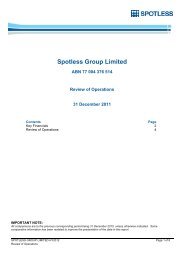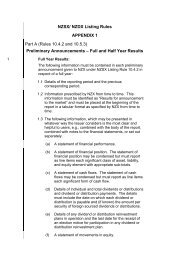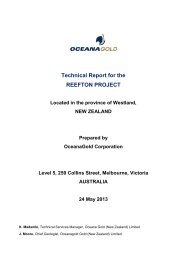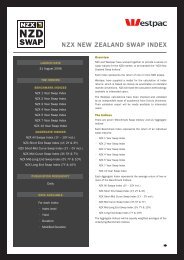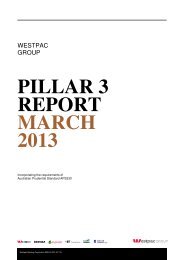Annual Report 2013 - Mainfreight
Annual Report 2013 - Mainfreight
Annual Report 2013 - Mainfreight
Create successful ePaper yourself
Turn your PDF publications into a flip-book with our unique Google optimized e-Paper software.
2 Summary of Significant Accounting Policies (continued)<br />
(q) Share-based Payment Transactions (continued)<br />
Equity Settled Transactions (continued)<br />
Until an award has vested, any amounts recorded are contingent and will be adjusted if more or fewer awards vest than were originally<br />
anticipated to do so. Any award subject to a market condition is considered to vest irrespective of whether or not that market condition<br />
is fulfilled, provided that all other conditions are satisfied.<br />
If the terms of an equity-settled award are modified, as a minimum an expense is recognised as if the terms had not been modified. An<br />
additional expense is recognised for any modification that increases the total fair value of the share-based payment arrangement, or is<br />
otherwise beneficial to the employee, as measured at the date of modification.<br />
If an equity-settled award is cancelled, it is treated as if it had vested on the date of cancellation, and any expense not yet recognised for<br />
the award is recognised immediately. However, if a new award is substituted for the cancelled award and designated as a replacement<br />
award on the date that it is granted, the cancelled and new award are treated as if they were a modification of the original award, as<br />
described in the previous paragraph.<br />
The dilutive effect, if any, of outstanding partly-paid shares is reflected as additional share dilution in the computation of diluted<br />
earnings per share (see note 9).<br />
(r) Contributed Equity<br />
Ordinary shares are classified as equity. Incremental costs directly attributable to the issue of new shares or options are shown in equity<br />
as a deduction, net of tax, from the proceeds.<br />
(s) Revenue Recognition<br />
Revenue is recognised and measured at the fair value of the consideration received or receivable to the extent it is probable that the<br />
economic benefits will flow to the Group and the revenue can be reliably measured. The following specific recognition criteria must also<br />
be met before revenue is recognised:<br />
(i)<br />
Rendering of Services<br />
Revenue for all domestic contracted deliveries is recognised when goods have been collected from the customer. Revenues<br />
derived from international freight forwarding are recognised for exports on freight departure and for imports on freight arrival.<br />
Fees for warehousing are recognised as services are provided to the counter-party.<br />
(ii) Interest Income<br />
Revenue is recognised as interest accrues using the effective interest rate method.<br />
(iii) Dividends<br />
Revenue is recognised when the Group’s right to receive the payment is established.<br />
(t) Income Tax and Other Taxes<br />
Current tax assets and liabilities for the current and prior periods are measured at the amount expected to be recovered from or paid to<br />
the taxation authorities based on the current period’s taxable income. The tax rates and tax laws used to compute the amount are those<br />
that are enacted or substantively enacted by the balance sheet date.<br />
Deferred income tax is generally provided on all temporary differences at the balance sheet date between the tax bases of assets and<br />
liabilities and their carrying amounts for financial reporting purposes.<br />
Deferred income tax liabilities are recognised for all taxable temporary differences except:<br />
• When the deferred income tax liability arises from the initial recognition of goodwill or of an asset or liability in a transaction that<br />
is not a business combination and that, at the time of the transaction, affects neither the accounting profit nor taxable profit or<br />
loss; or<br />
• When the taxable temporary difference is associated with investments in subsidiaries, associates or interests in joint ventures,<br />
and the timing of the reversal of the temporary difference can be controlled and it is probable that the temporary difference will<br />
not reverse in the foreseeable future.<br />
Financial Statements<br />
81








